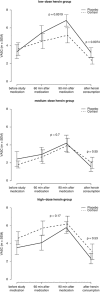Effects of cortisol administration on craving in heroin addicts
- PMID: 26218852
- PMCID: PMC5068724
- DOI: 10.1038/tp.2015.101
Effects of cortisol administration on craving in heroin addicts
Abstract
Heroin dependence is a severe and chronically relapsing substance use disorder with limited treatment options. Stress is known to increase craving and drug-taking behavior, but it is not known whether the stress hormone cortisol mediates these stress effects or whether cortisol may rather reduce craving, for example, by interfering with addiction memory. The aim of the present study was to determine the effects of cortisol administration on craving in heroin-dependent patients and to determine whether the effects depend on the daily dose of heroin consumption. We used a double-blind, placebo-controlled, cross-over study in 29 heroin-dependent patients in a stable heroin-assisted treatment setting. A single oral dose of 20 mg of cortisol or placebo was administered 105 min before the daily heroin administration. The primary outcome measure was cortisol-induced change in craving. Secondary measures included anxiety, anger and withdrawal symptoms. For the visual analog scale for craving, we found a significant interaction (P = 0.0027) between study medication and heroin-dose group (that is, daily low, medium or high dose of heroin). Cortisol administration reduced craving in patients receiving a low dose of heroin (before heroin administration: P = 0.0019; after heroin administration: P = 0.0074), but not in patients receiving a medium or high dose of heroin. In a picture-rating task with drug-related pictures, cortisol administration did not affect the ratings for the picture-characteristic craving in all the three heroin-dose groups. Cortisol also did not significantly affect secondary outcome measures. In conclusion, a single administration of cortisol leads to reduced craving in low-dose heroin addicts. The present findings might have important clinical implications with regard to understanding stress effects and regarding treatment of addiction.
Trial registration: ClinicalTrials.gov NCT01718964.
Figures


Similar articles
-
The Effects of Oxytocin on Withdrawal, Craving and Stress Response in Heroin-Dependent Patients: A Randomized, Double-Blind Clinical Trial.Eur Addict Res. 2019;25(1):41-47. doi: 10.1159/000496194. Epub 2019 Jan 10. Eur Addict Res. 2019. PMID: 30630161 Clinical Trial.
-
Cannabidiol for the Reduction of Cue-Induced Craving and Anxiety in Drug-Abstinent Individuals With Heroin Use Disorder: A Double-Blind Randomized Placebo-Controlled Trial.Am J Psychiatry. 2019 Nov 1;176(11):911-922. doi: 10.1176/appi.ajp.2019.18101191. Epub 2019 May 21. Am J Psychiatry. 2019. PMID: 31109198 Clinical Trial.
-
Acute effects of heroin on negative emotional processing: relation of amygdala activity and stress-related responses.Biol Psychiatry. 2014 Aug 15;76(4):289-96. doi: 10.1016/j.biopsych.2013.10.019. Epub 2013 Nov 4. Biol Psychiatry. 2014. PMID: 24314348 Clinical Trial.
-
[Heroin addiction].Acta Pharm Hung. 2011;81(4):173-83. Acta Pharm Hung. 2011. PMID: 22329304 Review. Hungarian.
-
Gamma-hydroxybutyric acid in the treatment of alcohol and heroin dependence.Alcohol. 2000 Apr;20(3):257-62. doi: 10.1016/s0741-8329(99)00089-0. Alcohol. 2000. PMID: 10869867 Review.
Cited by
-
Drug-Induced Glucocorticoids and Memory for Substance Use.Trends Neurosci. 2018 Nov;41(11):853-868. doi: 10.1016/j.tins.2018.08.005. Epub 2018 Aug 28. Trends Neurosci. 2018. PMID: 30170822 Free PMC article. Review.
-
The future of psychopharmacology: a critical appraisal of ongoing phase 2/3 trials, and of some current trends aiming to de-risk trial programmes of novel agents.World Psychiatry. 2023 Feb;22(1):48-74. doi: 10.1002/wps.21056. World Psychiatry. 2023. PMID: 36640403 Free PMC article.
-
Effects of cortisol administration on craving during in vivo exposure in patients with alcohol use disorder.Transl Psychiatry. 2021 Jan 5;11(1):6. doi: 10.1038/s41398-020-01180-y. Transl Psychiatry. 2021. PMID: 33414435 Free PMC article. Clinical Trial.
-
Substance use modulates stress reactivity: Behavioral and physiological outcomes.Physiol Behav. 2016 Nov 1;166:32-42. doi: 10.1016/j.physbeh.2016.02.024. Epub 2016 Feb 19. Physiol Behav. 2016. PMID: 26907955 Free PMC article. Review.
-
Neural Underpinnings of Cortisol Effects on Fear Extinction.Neuropsychopharmacology. 2018 Jan;43(2):384-392. doi: 10.1038/npp.2017.227. Epub 2017 Sep 26. Neuropsychopharmacology. 2018. PMID: 28948980 Free PMC article. Clinical Trial.
References
-
- UNODC . World Drug Report 2014. United Nations: New York, NY, USA; 2014.
-
- Leshner AI. Addiction is a brain disease, and it matters. Science. 1997;278:45–47. - PubMed
-
- UNDCP/WHO United Nations International Drug Control Programme and World Health Organization Technical Report Series (No. V92-54439T) United Nations International Drug Control Programme: Vienna, Austria; 1992.
Publication types
MeSH terms
Substances
Associated data
LinkOut - more resources
Full Text Sources
Other Literature Sources
Medical

